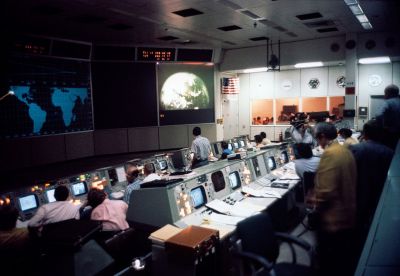So after a false start due to bad weather, the first crewed launch of a SpaceX Crew Dragon capsule with two astronauts on board has gone ahead. After playing catch-up with the ISS for around 27 hours they’re now safely aboard. At times it seems that space launches have become everyday occurrences, but they are still heroes who have risked their lives in the furtherment of mankind’s exploration of space. Their achievement, and that of all the scientists, engineers, and other staff who stand behind them, is immense.
I watched the drama unfold via the live video feed. Having heaved a huge sigh of relief once they were safely in orbit, the feed cut to the studio, and then moved on to interview the NASA administrator Jim Bridenstine. He was naturally elated at a successful launch, and enthused about the agency’s achievement. You can watch the full interview embedded below, but what caught my attention was his parting sentence:
And if this can inspire a young child to become the next Elon Musk, or the next Jeff Bezos, or the next Sir Richard Branson, then that’s what this is all about
I was slightly shocked and saddened to hear this from the NASA administrator, because to my mind the careers of Musk, Bezos, or Branson should not be the ones first brought to mind by a space launch. This isn’t a comment on those three in themselves; although they have many critics it is undeniable that they have each through their respective space companies brought much to the world of space flight. Instead it’s a comment on what a NASA administrator should be trying to inspire in kids.
Ask yourself how many billionaire masters-of-the-universe it takes for a successful space race compared to the number of scientists, engineers, mathematicians, technicians, physicists, et al. From the anecdote of the NASA administrator it takes about three, but if he is to make good on his goal of returning to the Moon in 2024 and then eventually taking humanity to Mars it will take a generation packed full of those other roles. To understand that we’ll have to take a trip back to the Apollo era, and how that generation of kids were inspired by the spacecraft on their screens.

Fifty years ago, we were very much on the brink of becoming a spacefaring planet. American astronauts were taking their first steps on the Moon, and Soviet cosmonauts were occupying real space stations that would soon be capable of housing them for months at a time. Planetary probes were returning colour TV pictures from other worlds, and it was certain that in the immediate aftermath of the Apollo programme we’d be sending astronauts and probably cosmonauts too further afield. A Mars base in the 1980s perhaps, and following our fictional Star Trek heroes further afield thereafter.
We now know it didn’t quite work out that way, but a whole generation of tech-inclined kids grew up wanting nothing more than to be involved in space flight. The vast majority of us never made it, but with that inspiration we took our soldering irons and 8-bit home computers and ran with them. Those NASA folks were the coolest of role-models, and no doubt their Soviet equivalents were too for kids on the other side of the Iron Curtain.
With the best will in the world, the chances of any kid becoming the next Jeff Bezos is about as high as that of their becoming the next Neil Armstrong. Compared to the number of kids in the world, the number of billionaires and the number of astronauts both pale into statistical insignificance. But the chances of a kid becoming an engineer or a scientist is much higher, and in those careers their chances of having some of their work be involved with the space effort becomes not entirely unlikely.
I understand what the NASA administrator was trying to say, but can’t shake the feeling that if those are the people he rolls out to inspire kids watching a space launch, he’s missed an opportunity. Those are the names we all recognize, but shouldn’t we also elevate the people making the scientific breakthroughs so their names are equally recognized? Like Margaret Hamilton, Gene Kranz, and Sergei Korolev and many others before them, we should be making names like Tom Mueller and Margarita Marinova prominent examples of where a career in the sciences can take you. But to be honest, the real problem is we just don’t hear much about all the people doing this fascinating engineering and that’s a sad state of affairs.
Looks like it’s time for Hackaday to pursue a biography series based on the many great minds who are the ones delivering on the promise and vision of today’s (and tomorrow’s) space race. Get us started by talking about your favorite behind the scenes science folks in the comments below.

















One of my favorite quotes:
William Gladstone: ‘What is this new discovery and why do you need such high funding? What’s the importance of these.. electricity?’
Michael Faraday: ‘One day, sir, you may tax it..’
Unfortunately, no matter how many years of evolution have passed, the Golden Rule is: Whoever has the gold, makes the rules..
For behind the scenes people to checkout, I would recommend trying to learn more about both Lars Blackmore and Balachandar Ramamurthy.
Mr. Blackmore was a major factor in SpaceX developing reusable launch vehicles. He made MITs 30 under 30 list here:
https://www.technologyreview.com/innovator/lars-blackmore/
Mr. Ramamurthy was the sitting Launch Chief Engineer for SpaceX’s recent Demo2 launch. You can hear Astronaut Bob Behnken thank him for keeping them safe on the comms. Mr. Ramamurthy’s story is actually quite inspirational in that he is very much a self made man that started small, pursued a Bachelor’s Degree in engineering, and then managed to become instrumental in SpaceX’s human spaceflight program. He also had a hand in founding physics R&D company on the side:
http://www.positrondynamics.com/#titles-1
Oops, Jenny. My comment wasn’t targeted at you (nor at your article, with which I agree “+100”, as I stated elsewhere in the comments) but at cb88. I disagreed with “nothing happens without profit”, and then came that old “capitalist vs. communist” saw.
It seems I can’t properly handle the comment system, sorry.
We have 1000 times as many engineers and scientists as we need to open space, while we have 1/1000 the number of people willing and able to fund it. The need for more billionaires is MUCH greater than the need for more engineers.
Well if that were really true, the glut of capable engineers without hope of finding a job, would be willing to work for minimum wage, so mere millionaires could employ them as rocket surgeons.
You claim you understand what the “administrator” was trying to say. For me it is clear that the “administrator” knew what he wanted to say and it is also clear that you don’t. No, the “administrator” did not imply that everyone with an interest in Space should draw their inspiration from the “billions” of any billionaire. It should be clear that, what could drive one’s inspiration is those persons’ vision. A vision that drives a billionaire to spend his capital on a new age of space-race instead of his own well-being. The same vision that would enable any other human to dedicate his efforts and time to the same purpose, in a similar manner and commitment. No-one has to actually become a billionaire to promote and become a part of this new space-race trend. But anyone who is motivated by the achievements of these entrepreneurs can set their sights so that humanity can pursue a new, sustainable space-race, whether he/she might be an engineer that makes things, a journalist that influences his/her readers, a teacher that educates his/her students.
You have also gotten awfully wrong the context of the Cold War space-race. You refer to it with some kind of nostalgia and awe. Judging by its results, no, fifty years ago we were NOT “on the brink of becoming a spacefaring planet”. We were just spending tons of resources in an unproductive manner. It is only natural that the Cold War space-race ended up in a dead-end with respect to humanity’s ability to be a space-faring race. The Soviets gave up, there was really no point in pursuing any space-related achievement the way things were going. At the pinnacle of the irrelevancy of the space-race you admire, they even ended-up flying the Buran once, proved that “it works”, put it in a hangar to rot and that’s all folks for more than a decade. Same story for the americans with the only notable difference being the regular use of the very dangerous and inefficient Space Shuttles. Even the Moon-landings proved to be a short-term achievement: if we want to go back to the Moon today, we have to start from scratch. The american space program ended up being a shadow of its older self. All these FACTS did not happen without a very good reason: it was economically unsustainable. The Cold War space-race dead-end is a fact and its result is that it offered much less than it could have, if our purpose is to be a space-faring race. As such, we can view this period as a lost opportunity AT BEST. And by far, not something to look back and admire.
On the other hand, 2020 brings the private sector to the fray. I feel it is ridiculous when I read comments referring to “profit” as the cradle of all evil. It shows that people have no idea how reality works. Really, what do they expect? Elon Musk to… open-source his rockets? And what would they do with the blueprints… build one? “Profit” is an indicator of viability and sustainability. If the private sector leads us to a Moon or even a Mars landing, this will be a very good indication that we have conquered these achievements for good because, once the private sector invests enough to make it profitable, it is bound to keep attracting investment. And then we can attempt to go a little further. If not, it would be a clear indication that certain aspects of the endeavor need to mature even more and we need to try again in the future. This is NOT a bad thing. Achieving the goal of being a space-faring race is not a sprint, it is a Marathon. Applying the proverb “put your money where your mouth is” to the Space sector is actually a very good thing if humanity’s objective is to be a space-faring race.
Hell of a point you make Jenny. Very disappointing from NASA. Used to be that the director NASA was the one heading humanity’s efforts in space; now it seems like a role that solely exists to heap praise on the private companies that stole their thunder.